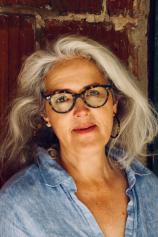Reading Group Guide
Discussion Questions
The Guest Book

1. Evie teaches her students that “history is sometimes made by heroes, but it is also always made by us. We, the people, who stumble around, who block or help the hero out of loyalty, stubbornness, faith or fear. Those who wall up --- and those who break through walls. The people at the edge of the photographs. The people watching --- the crowd. You.” Do you agree with her? How do the characters in this novel shape history? And whose history do they shape?
2. Central to Paul’s academic work is the idea that “there is the crime and there is the silence.” How does that statement echo throughout the novel, specifically in his and Evie’s conversations about the stumble stones in Germany? How is that silence a kind of willed forgetting? Do you think Ogden was right to not divest from Nazi Germany and try to work within the regime? Was this a version of silence that Paul is criticizing? What kinds of silences do we reproduce in our lives in this country now?
3. Evie reflects at one point, “The jobs had been gotten, the beds made, the dishes washed, the children sprouted. The wheel had stopped and now what? Where, for instance, was the story of a middle-aged orphan with the gray streak in her hair, the historian who had rustled 13th-century women’s lives out of fugitive pages who believed more than most that there was no such thing as the certainty of a plot in the story of a life, in fact who taught this to students year in and year out, and yet who found herself lately longing above all else for just that? Longing, against reason, for some kind of clear direction, for the promise of a pattern. For the relief, she pulled against the shoulder strap of her satchel, the unbearable relief of an omniscient narrator.” What does she mean? What is the significance of the author’s choice to make Evie middle-aged?
4. During her trip to America, Elsa tells Mrs. Lowell, “Forgive me…but it is a mistake to think news happens somewhere else. To others. The news is always about you. You must simply fit yourself in it. You must see how --- you must be vigilant.” Do you agree? How does her warning resonate for each generation of Miltons? Do you think the author is consciously echoing Evie with what she tells her students (question #1) in referencing “you”? And if so, what does the author suggest about collective responsibility?
5. On the porch later that evening, after Kitty says no to Elsa, Kitty is maddened by Elsa’s reading of her refusal. “For god’s sake,” she says, “it’s not so simple.” And Elsa replies, “But it is. It’s very simple. It always is.” Is Kitty’s refusal simple? How might Neddy’s death have shaped her thoughts? Does it let her off the hook in terms of Elsa’s request?
6. Evie says of her parents’ generation that they seem to have “inherited their days rather than chosen them, made do with what they had, and so they peopled the rooms rather than lived in them, ghosting their own lives.” Is that a fair assessment? Discuss the similarities and differences between the various generations of Miltons in this novel in relation to what they have been given.
7. At Evelyn’s engagement, Ogden toasts: “Behind every successful man is a good woman…Or so the saying goes. But I suggest a good woman is the reason men put up walls and gardens, churches. The reason men build at all. At the center of every successful man is a good woman.” How do you read this in light of Evie’s thesis about the anchoress? Discuss the gender dynamics at play in the different marriages in this novel.
8. Watching Moss on the night of the party, Reg thinks: “Moss sang his heart on his sleeve, as if all the gates of the world would open with him, believing that they could, with all his heart. But here on the island, the care with which Reg was being handled, the pronounced attention was merely the opposite face of the face that gave the hard stare, or the push between the ribs, or the whip. Both faces turned to the black man as though to a wall that had to be climbed or knocked down --- and always with the infinitesimal moment of wariness that slid immediately into anger or polite regard.” How does Reg’s point of view here counter and complicate Moss’ optimistic belief that he can write a song that unites all Americans? What is Reg seeing? Do you think the Miltons ever come to see what he sees?
9. Moss describes to Reg the experience of seeing "A Raisin in the Sun": “It was the first time I’d ever seen my own story on the stage…To see something, to want it that bad. To want and want and know that it’s impossible --- it’s impossible.” What do you think about Moss, a privileged white man, making a claim like that regarding a seminal play about the experience of African Americans?
10. Paul tells Evie, “There is no story until we’re dead, and then our children tell it. We are just living. Your mother was living. Stop looking for what’s not there. Nothing happened --- life happened. Reality is not a story.” Do you agree? What does Paul’s view suggest about how much we can ever truly know our family members? How does Paul’s statement complicate Evie’s view of history? Given that we know there was a story beneath the story of Joan’s life, a story that Evie couldn’t see, what does this suggest about the relation between truth and reality? What does that suggest about the act of novel writing?
11. What does Crockett’s Island represent for each generation of Miltons? Discuss the pros and cons of Evie’s generation fighting to keep the island or let it go. In what ways can a place both bind and define us? And how does the story we tell about ourselves connect to that place? Does your family have a place with a similar kind of significance?
12. At the end of the novel, before he says goodbye, Reg asks Evie what she will do with the island now that she knows its more complicated truths, and when she says, “I don’t know,” he answers, “That’s a start.” What do you think he means by that? What has started? What is the novel asking about the relation between knowledge of the past and responsibility to one another in the present? How does Reg’s response ask us to think about what we do once we see the full story (or history) of a place? In light of Elsa’s words in the beginning (question #4), perhaps it’s not so simple, but is it hopeful?
The Guest Book
- Publication Date: May 5, 2020
- Genres: Fiction
- Paperback: 512 pages
- Publisher: Flatiron Books
- ISBN-10: 1250110270
- ISBN-13: 9781250110275







